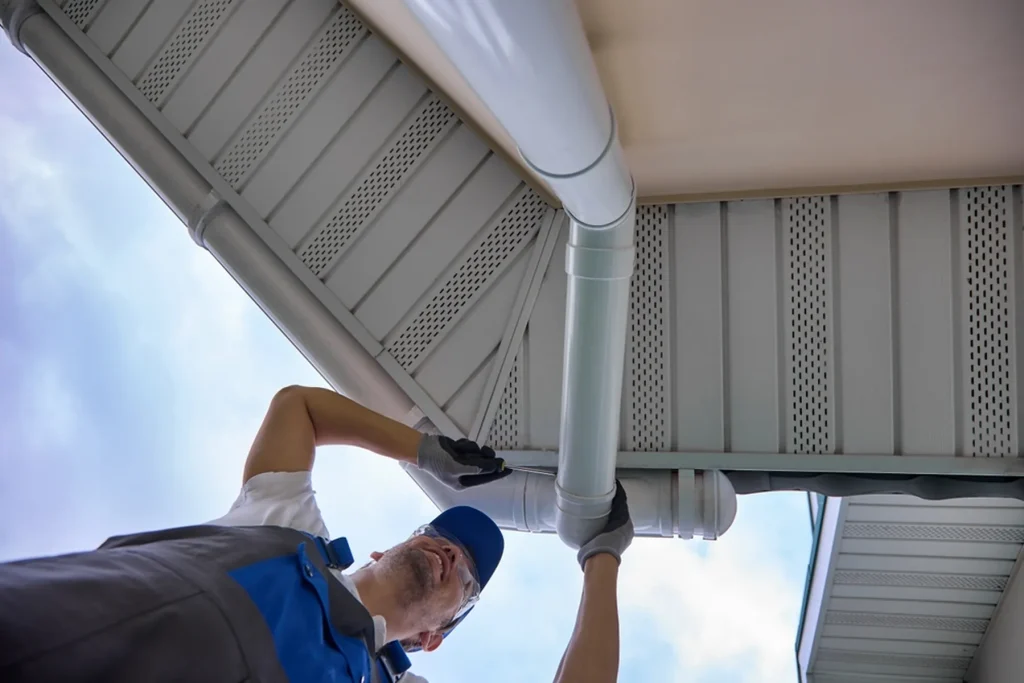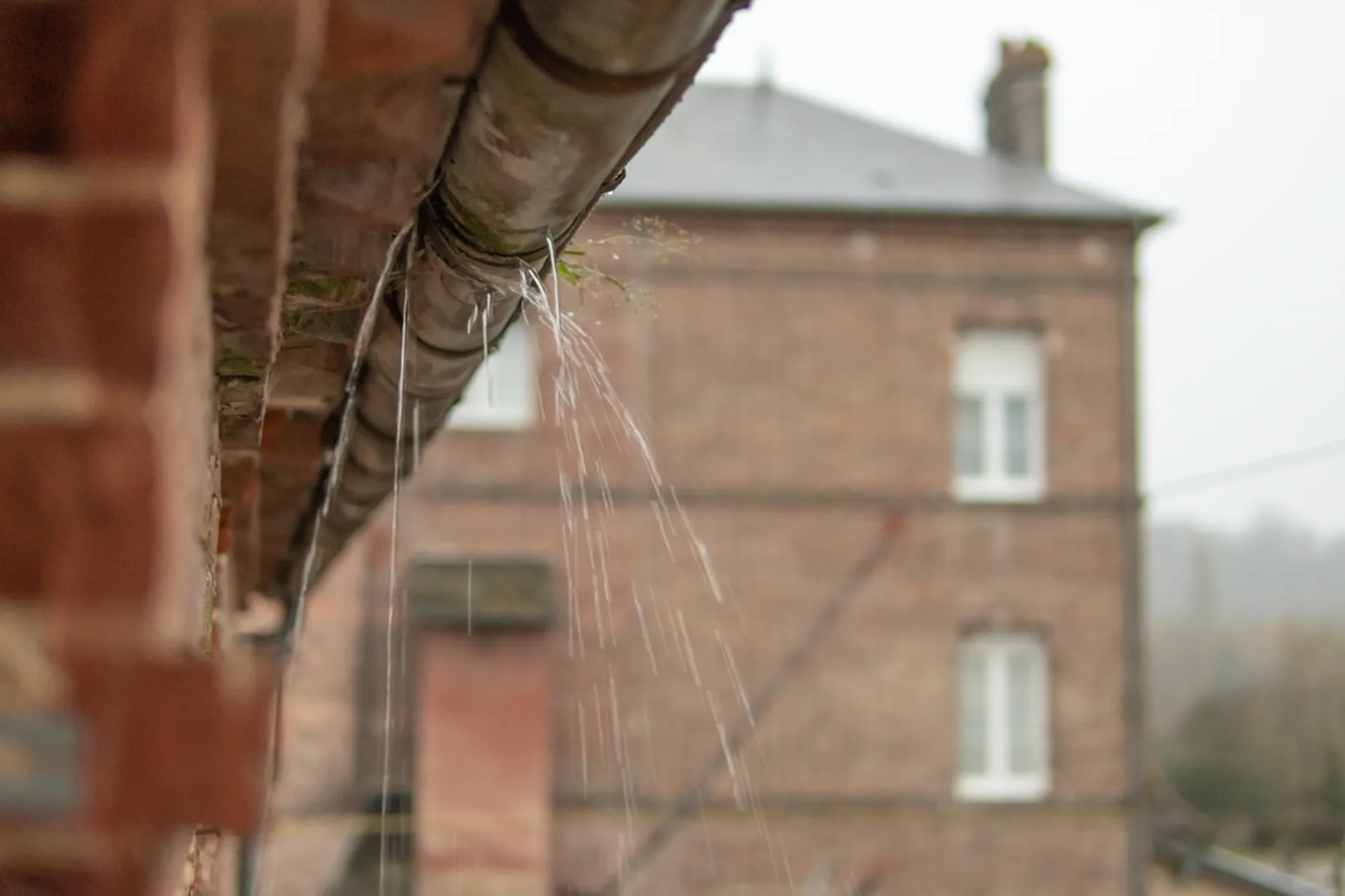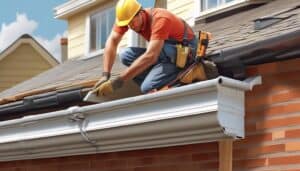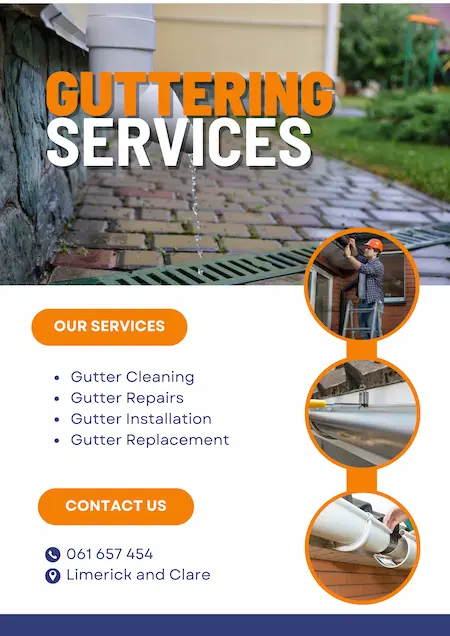Table of Contents
ToggleIn this essential guide, we’ll show you everything you need to know about choosing, installing, and maintaining gutter downpipes for a water-resilient home.
From determining the ideal number of downpipes based on your roof size and pitch to ensuring proper sealing with silicone spray, and even connecting your downpipes to underground drainage or a water butt for rainwater harvesting, we’ve got you covered.
Get ready to create a water-resilient home with our expert advice! Let’s dive in!
Key Takeaways
- The number of downpipes needed for a gutter system depends on the size and slope of the roof, with a general rule of thumb being one downpipe for every 9m (30ft) of gutter.
- Using silicone spray on gutter joints is recommended to assist with the connection of fittings without damaging seals.
- Downpipes can be connected to underground drainage pipes using adaptors, but gutter guards should be installed to prevent blockages from debris.
- Connecting a downpipe to a water butt is advisable as it allows for water collection and usage, reducing water bills and benefiting the environment.
How Do You Size and Place Gutters and Downspouts?
To ensure optimal water flow and drainage, determine the number of downpipes needed based on the size and pitch of your roof.
Sizing and placement of downpipes are crucial factors in maintaining an efficient gutter system. The size of your roof will determine the amount of rainwater being channelled through the gutters.
As a general rule, you should have one downpipe for every 9m of gutter. This ensures that the capacity of your system can handle the flow of water. When it comes to placement, it’s important to strategically position the downpipes to distribute the water and prevent any pooling or overflowing evenly.
By sizing and placing your downpipes correctly, you can ensure proper water drainage and prevent potential issues with your gutter system.

Why Use Silicone Spray for Gutter Joints?
To ensure a secure and watertight connection between gutter fittings and gutters, it is essential to use silicone spray. This spray facilitates the connection without compromising the seals, providing a reliable solution for installing and maintaining gutters. Silicone spray is specifically designed for use with gutter joints, ensuring a tight and leak-free fit. It helps to lubricate the connection, making it easier to assemble and disassemble the fittings when necessary.
Additionally, silicone spray creates a protective barrier that helps to prevent corrosion and extends the lifespan of the gutter system. By using silicone spray on gutter joints during installation and maintenance, you can ensure a water-resilient home and avoid the potential for costly water damage.
What Is the Importance of Connecting Downpipes to Underground Drainage?
When connecting downpipes to underground drainage, it is important to consider the potential for blockages and the need for gutter guards to prevent debris from entering the system. Connecting your downpipes directly to underground drainage pipes can help avoid the hassle of regularly cleaning out gullies and grids.
However, it is crucial to install gutter guards to prevent leaves and debris from falling into the downpipes. Without a grid and gully trap to catch this material at the discharge end, clearing any potential blockages in the downpipes becomes more challenging.
By taking these precautions, you can ensure that your underground drainage system remains free-flowing and efficient. Regular maintenance and inspection are also essential for identifying the reasons for gutter leaks and addressing them promptly to maintain the proper functioning of the system.
What Are the Benefits of Connecting Downpipes to Water Butts?
By connecting your downpipes to water butts, you can effectively collect and store rainwater for various uses in your home and garden. There are several benefits to connecting downpipes to water butts:
- Water conservation: Connecting your downpipes to water butts allows you to collect rainwater, which can be used for watering plants, washing your car, or even flushing toilets. This helps reduce your reliance on mains water and promotes sustainable living.
- Cost savings: Utilizing rainwater from your water butts can significantly reduce your water bills. Instead of using treated water for outdoor tasks, you can use the free resources provided by nature.
- Environmental impact: By using rainwater from your water butts, you are reducing the need for water extraction and treatment, which conserves energy and reduces carbon emissions.
- Drought resilience: During dry periods or water restrictions, having a supply of rainwater stored in your water butts can help ensure that you can still maintain your garden or carry out essential tasks.
- Easy maintenance: Water butts are generally low-maintenance and require minimal attention. Regularly emptying and cleaning your water butts will help maintain water quality and prevent any blockages in the downpipes.
Connecting your downpipes to water butts provides practical and sustainable solutions for water usage, saving you money and benefiting the environment.
Conclusion
By choosing the right number of downpipes, using silicone spray for proper sealing, and considering options like underground drainage and water butt connections, you can create a water-resilient home. Just like a well-designed gutter system directs water away from your home, these measures ensure that your home is protected from water damage and ready to weather any storm. So, take the time to invest in your gutter downpipes and enjoy the peace of mind that comes with a water-resilient home.
If you are looking for professional gutter cleaning services in Limerick, feel free to contact us for a consultation. We ensure that your gutters are clean and functioning properly. Don’t let clogged gutters cause water damage to your home. Trust our experts to keep your gutters in top shape.
Frequently Asked Questions
Gutter downpipes are a crucial part of a rainwater drainage system, designed to channel water from the gutters to the ground or a drainage system. They come in various shapes and sizes to suit different requirements.
Gutter downpipes are commonly made of materials such as PVC, aluminium, or steel. These materials are chosen for their durability and resistance to rust and corrosion.
When choosing gutter downpipes, consider factors such as the size of your roof, local weather conditions, and the style of your building. It’s also important to select downpipes that are compatible with your gutter system.
Gutter downpipes are available in various shapes, including round and square profiles. They also come in different sizes to accommodate different roof areas and rainfall volumes.
Our gutter downpipes are crafted with high-quality materials, ensuring durability and long-term performance even in harsh weather conditions. We are dedicated to providing top-notch rainwater management solutions.






